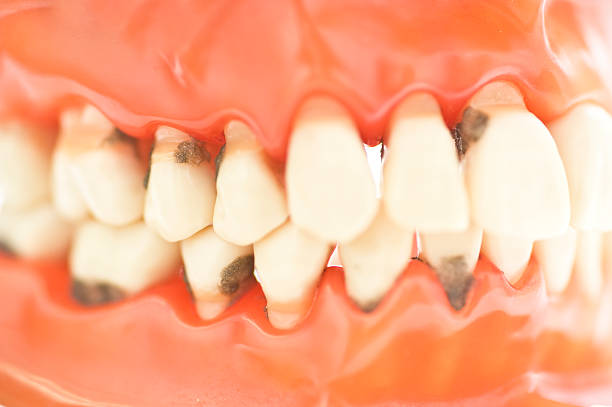The attractiveness of your smile depends on dental aesthetics as sparkling-white healthy teeth give you an electrifying smile. If you or your children are not practicing a standard oral care regimen, your teeth are at higher risk of cavities and decay. If you are not brushing and flossing properly, the carbohydrate-rich food particles remain stuck in between teeth. Bacteria present in the mouth thrive on sugar and starch particles and turn them into acids. It ultimately leads to plaques formation, and acid present in plaques erodes the enamel and destroys dentin of your teeth causing cavities. These teeth with cavities are called rotten teeth. If not treated in time, these rotten teeth become loose and fall out. The destruction of enamel happens gradually, so it is better to visit your dentist regularly to keep your teeth cavity-free and smile with confidence.
Symptoms of rotten teeth
Bacteria are a natural inhabitant of your mouth as they have a perfect moisture-temperature environment with a regular supply of food to thrive. Regular brushing, flossing, and mouthwash cut the chances of tooth decay or rotten teeth significantly, but unfortunately, the majority of people lose one or more teeth due to bad oral hygiene. You can prevent permanent damage to your teeth, but for that, you have to identify symptoms of tooth decay. Your dentist will let you know about rotten teeth and recommend suitable treatment to avoid further decay. Here are some of the symptoms of rotten tooth:
- You will notice hole formation with the black deposit on the enamel
- If the hole gets deeper, it erodes dentin thus causing the toothache
- Cavities make your tooth sensitive to cold and hot
- White, black, or brown spot formation on the tooth surface
- Excessive bacteria along with food makes your breath bad
- If the cavity is too deep it could cause gum infection and swelling
Tooth decay isn’t only about adults, as the teeth of toddlers and children are more prone to plaque formation and decay. Blame it on sugary food and oral hygiene habits, but you have to monitor the kid’s oral space constantly and take your kids to the dentist regularly to keep their teeth cavity-free.
Causes of Rotten Teeth
The dental system is very complex but strong enough to endure consistent friction caused by chewing. All you need to do is keep your oral space clean so that bacteria count remains in control. If bacteria find a suitable environment loaded with carbohydrates then acids will erode the strong enamel slowly, making your teeth susceptible to irreversible decay. To keep your teeth healthy, you should know about factors that cause rotten teeth.
Bad Oral Hygiene
If you are cleaning your oral space daily, you are inviting bacteria to thrive in the mouth and release toxins to erode the natural enamel of your teeth. Plaque formation along with acid makes your teeth fragile, leading to cavity formation and further destruction of dental structure.
Poor Diet
Food items loaded with carbohydrates and sugar cling to teeth, thus triggering bacterial outgrowth. Excessive bacteria growth leads to excessive acid formation, resulting in a faster breakdown of tooth enamel. If you are consuming sugary acidic beverages, you are at higher risk of tooth decay.
Dry Mouth
Saliva helps in bacteria control and washing away plaques. If your salivary glands aren’t producing the optimum amount of saliva you are at higher risk of the rotten tooth as acid remains in the mouth to cause enamel loss.
Dental Crevices
If your teeth have deep crevices, it will be tough to clean your teeth thoroughly. Deep crevices offer a suitable environment for plaque formation and bacterial growth. If not cleaned by the dentist, it will lead to cavity formation and enamel loss. To prevent plaque formation and tooth protection, your dentist might recommend applying a dental sealant.
Fluoride Deficiency
Fluoride makes your dental system strong. So, if you have fluoride deficiency you are more prone to tooth decay. You can use fluoride toothpaste to strengthen enamel and prevent plaque buildup.
Baby Bottle
Just like adults, tooth decay is very common among kids as they are dependent on milk and milk products. If your baby sleeps with a milk bottle, sugar will remain in the mouth for a long leading to excessive acid formation and tooth decay. The tooth enamel deteriorates faster if your child is an aggressive chocolate eater and forgets to clean teeth regularly.
What Are the Treatments For Rotten Teeth?
Rotten teeth affect both functionality and aesthetics, so you will have difficulty eating and of course, makes you self-conscious. If you notice tooth decay, you should get in touch with your dentist so that he could start suitable treatment to control tooth decay and save your natural tooth. Whatever is your age, treatment depends on the severity and stage of tooth decay. Here are some of the effective treatments recommended for rotten teeth:
Early Stage Treatment
If your cavity is small, your dentist will perform fluoride treatment. The idea is to strengthen enamel to stop further decay. It helps in re-mineralization, meaning the cavity could be reversed. This treatment is effective for smaller cavities only, so let your doctor examine your case and start the treatment accordingly. Additionally, you have to ensure your dental system remains healthy to stop bacterial growth.
Advanced Stages Treatment
If the cavity is deep and affects the dentin, your doctor will first remove plaques and decayed parts using suitable tools. Once done with cleaning, the dentist will recommend dental filling or dental crown to make your teeth functionally and aesthetically better. You can choose filling material depending on your preference. You have tooth-colored composite resin, amalgam fillings like silver, gold, or mercury. Nowadays, dentists prefer using dental crowns, which are a kind of cap made of strong material.
Treatment for Severe Rotten Tooth
Ignoring cavities for long could make your tooth dead, meaning it will permanently lose the functionality. If the decay has reached deeper and is causing inflammation, your dentist might recommend root canal treatment. In the procedure, your dentist will first remove the infected nerve and pulp and then fills the space with suitable dental sealants. This will save your natural tooth.
However, if the tooth is functionally dead your dentist will recommend extracting the tooth to protect gums and surrounding teeth. After tooth removal, your dentist will offer you the option to replace the rotten tooth with a denture, bridge, or implant.
If your child has a severely decayed tooth, you should not wait for it to fall out naturally as premature fall could affect the alignment of permanent teeth. So, it is better to opt for root canal treatment and protect the teeth from premature loss.
Dangers of Rotten Teeth
Besides functionality and aesthetics, a rotten tooth could cause several dental and other complications. Seeing your tooth rot gradually and doing nothing can be dangerous.
Here are some of the dangers of rotten tooth:
- Although rare, rotten teeth affect the immune system badly, making your reflexes weak.
- Your hands might start trembling at an early age.
- Rotten teeth will make you self-conscious, thus draining your physical and mental energy.
- If the rot is deep with damaged nerves it could lead to poisoning of the bloodstream.
- One of the most common dangers of rotten teeth is the weakening of the gums, thus making even healthy teeth vulnerable to early loss.
- The pain and eating discomfort that with rotten teeth affects your food choices, so you have to sacrifice some of your favorite food items.
- If your immune system is weak, a rotten tooth can cause sepsis—a kind of blood infection.
- Harmful bacteria in your mouth, if left untreated for long, could reach the brain via the bloodstream. This could lead to a serious life-threatening medical condition called meningitis.
One simple and effective way to avoid these dangers is a quality oral care regimen. Brush twice a day and floss your teeth regularly to keep your oral space bacteria-free. Visit your dentist regularly, at least every six months, to keep your dental system healthy.
Preventing Tooth Decay
You are aware of the dangers of tooth decay or rotten teeth, so it is important to do everything possible to prevent tooth decay. Oral hygiene experts often recommend these tooth decay preventive measures:
- Ideally one should brush teeth twice a day with a soft-bristled toothbrush and toothpaste containing fluoride.
- Food particles remain stuck in between teeth, so remove them regularly with dental floss.
- Bacteria grow naturally in the mouth, so use medicated or saltwater rinses to control bacteria growth and plaque formation.
- It is not possible to avoid carbohydrates totally, so eat healthy nutrient-rich meals and don’t forget to clean your teeth after the meal. Avoid sticky food as much as you can to prevent tooth decay.
- If needed, use a fluoride supplement to strengthen teeth enamel.
- If molars are deteriorating faster, ask your dentist about dental sealants to prevent further decay.
- Drink fluoride water to make your dental system strong
Most importantly, visit your dentist at regular intervals so that he could tell you about dental health, ailments, and suggest suitable treatments. Studies suggest that mouthwash rinse and quality toothpaste can reverse early cavities, so ask your dentist about suitable oral care products.
Bottom Line
Your smile is invaluable, and it is very easy to make it electrifying. Just keep your oral space clean so that bacteria couldn’t thrive. But if you are noticing the development of a cavity in your tooth, you should get in touch with your doctor to control the decay. Delaying it could be dangerous, so maintain your oral hygiene and visit the dentist regularly to have long-lasting sparkling white teeth to smile with confidence.
Sources:
- Pollick, H. (2018). The role of fluoride in the prevention of tooth decay.
https://www.pediatric.theclinics.com/article/S0031-3955(18)30077-4/pdf - Berkowitz, R. J. (2003). Causes, treatment and prevention of early childhood caries: a microbiologic perspective.
https://cda-adc.ca/jcda/vol-69/issue-5/304.pdf - Boyd, J. D. (1942). Nutrition as it affects tooth decay.
https://www.cabdirect.org/cabdirect/abstract/19421401649 - Yengopal, V., Harnekar, S. Y., Patel, N., & Siegfried, N. (2009). Dental fillings for the treatment of caries in the primary dentition.
https://www.cochranelibrary.com/cdsr/doi/10.1002/14651858.CD004483.pub2/abstract


